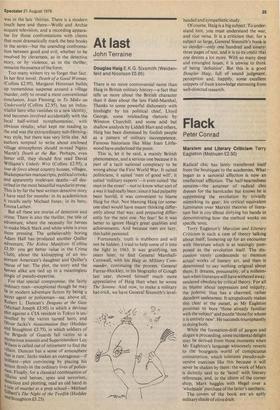Flack
Peter Conrad
Marxism and Literary Criticism Terry Eagleton (Methuen £2.50)
Radical chic has lately transferred itself from the boutiques to the academies. What began as a sartorial affection is now an intellectual affliction. The half-heartedness remains—the amateur of radical chic dresses for the barricades but knows he is suppressing the revolution by trivially mimicking its gear; his critical equivalent fulminates over Marxist theories of literature but is coy 'about dirtying his hands in demonstrating how the method works on specific texts.
Terry Eagleton's Marxism and Literary Criticism is such a case of theory talking about itself, limbering up for an encounter with literature which is as teasingly postponed as the revolution itself. The discussion rarely condescends to mention actual works of literary art, and then is determined to say nothing original about them. It dreams, presumably, of a millennium when literature will have withered away, rendered obsolete by critical theory. For all its bluster about oppression and iniquity, the polemic thus has a charmed, rather decadent uselessness. It scrupulously makes this clear at the outset, as Mr Eagleton promises to bore 'those already familiar with the subject' and puzzle 'those for whom it is entirely new'. He succeeds triumphantly in doing both.
While the formation-drill of jargon and slogan is proceeding, some incidental delight may be derived from those moments when Mr Eagleton's language winsomely reverts to the bourgeois world of conspicuous consumption, which tolerates pseudo-subversive exercises like this because it will never be shaken by them : the work of Marx is daintily said to be 'laced' with literary references, and, in the idiom of the corner shop, Marx haggles with Hegel over a 'wholesale' purchase of the latter's aesthetic.
The covers of the book are an aptly military shade of olive drab.


































 Previous page
Previous page